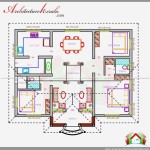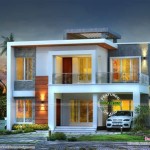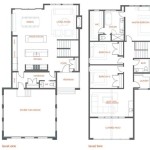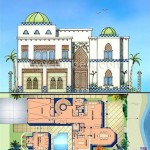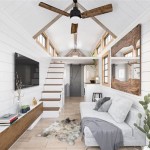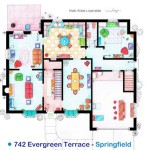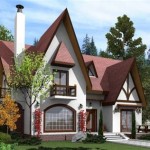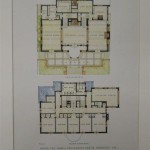Log Cabin Modular Homes Floor Plans
Log cabin modular homes offer a unique blend of rustic charm and modern convenience. These homes are constructed using modular building techniques, meaning sections are built in a factory-controlled environment and then transported to the site for assembly. This process offers several advantages, including faster build times, reduced costs, and increased quality control. Coupled with the aesthetic appeal of log cabin design, modular construction presents an attractive option for prospective homeowners.
Key Advantages of Log Cabin Modular Homes
Modular construction offers several distinct advantages over traditional site-built homes:
- Faster Construction Timelines
- Cost-Effectiveness
- Enhanced Quality Control
- Eco-Friendly Building Practices
- Design Flexibility
Understanding Log Cabin Modular Home Floor Plans
Floor plans for log cabin modular homes are crucial for visualizing the layout and functionality of the future home. These plans provide a detailed blueprint, outlining the dimensions of each room, the placement of walls, windows, and doors, and the overall flow of the living space. Carefully considering the floor plan is essential for ensuring the home meets the specific needs and lifestyle of the occupants.
Popular Log Cabin Modular Home Floor Plan Styles
Several popular styles are commonly found in log cabin modular home floor plans:
- Ranch Style: Single-story homes with open floor plans, offering accessibility and ease of movement.
- Chalet Style: Often featuring sloped roofs, exposed beams, and large windows to maximize natural light and scenic views.
- A-Frame Style: Characterized by their triangular shape, these designs often incorporate lofted spaces and maximize usable floor area.
- Cabin Style: Classic designs emphasizing cozy living spaces, fireplaces, and front porches.
- Two-Story Designs: These plans offer increased living space and often separate living areas from sleeping quarters.
Considerations When Choosing a Floor Plan
Selecting the right floor plan requires careful consideration of several factors:
- Lot Size and Topography: The chosen floor plan should complement the site's characteristics.
- Lifestyle and Needs: The layout should accommodate the occupants' daily activities and preferences.
- Budget: The complexity and size of the floor plan will significantly impact the overall cost.
- Number of Bedrooms and Bathrooms: The floor plan should provide adequate space for all occupants.
- Future Expansion Potential: Consider the possibility of future additions or modifications.
Customizing Log Cabin Modular Home Floor Plans
One of the significant benefits of modular construction is the flexibility it offers in terms of customization. While pre-designed floor plans are available, many manufacturers allow modifications to suit individual preferences. This can include altering room sizes, adding or removing walls, and customizing window and door placements. Consulting with a modular home builder is essential to explore the customization options available.
Key Features to Look for in a Floor Plan
Beyond the basic layout, certain key features enhance the functionality and livability of a log cabin modular home:
- Open Floor Concepts: These layouts create a sense of spaciousness and facilitate interaction between living areas.
- Ample Storage Space: Incorporating closets, pantries, and other storage solutions maximizes functionality.
- Natural Light: Strategically placed windows and skylights can brighten the interior and reduce energy consumption.
- Outdoor Living Spaces: Decks, patios, and porches extend the living area and provide opportunities for relaxation and entertainment.
- Energy Efficiency: Consider floor plans that incorporate energy-saving features such as proper insulation and efficient window placement.
Working with a Modular Home Builder
Collaborating with an experienced modular home builder is crucial throughout the entire process. Builders can provide guidance on selecting a suitable floor plan, navigating local building codes, and managing the construction timeline. They also offer valuable insights into customization options and material selections. Open communication and collaboration with the builder are essential for ensuring a successful building experience.
Researching and Comparing Floor Plans
Before making a final decision, it is advisable to thoroughly research and compare various floor plans. Online resources, manufacturer brochures, and home shows can provide valuable information and inspiration. Visiting model homes, if available, allows for a firsthand experience of the layout and flow of different designs. Taking the time to carefully evaluate various options ensures a well-informed decision that aligns with individual needs and preferences.
Budgeting and Financing
Developing a realistic budget is essential when considering a log cabin modular home. The cost of the home will vary depending on the size, complexity of the floor plan, chosen materials, and site preparation requirements. Securing pre-approval for financing is a crucial step in the process and allows for a clear understanding of the affordable price range. Working with a financial institution specializing in modular home financing can streamline the process and provide access to tailored loan options.

Log Cabin Floor Plans Kintner Modular Home Builder Pennsylvania Quality Prefab Contractor

Log Cabin Modular Home Kintner Builder Pennsylvania Quality Prefab Contractor

Log Cabin Floor Plans Kintner Modular Home Builder Pennsylvania Quality Prefab Contractor

Frontier Log Homes Luxury Cabin Montrose Co

Tiny Log Cabin Kits Easy Diy Project House Plans Small

Log Home Plans And Kits Cedar Knoll Homes Floor

Small Log Cabin Plans Tiny Cabins For Gastineau Homes

The Richmond Log Home Floor Plan 3 Bedroom Contemporary Style Re Cabin Plans

Tiny Log Cabin Kits Easy Diy Project House Design Plans

Tiny Log Cabin Kits Easy Diy Project Craft Mart

